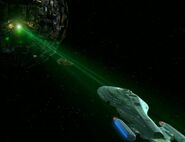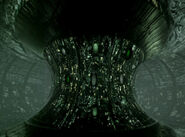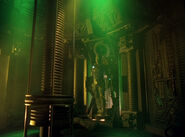The Borg long-range tactical vessel, commonly referred to by the Federation as a Borg sphere, was a sphere-shaped starship used by the Borg Collective during the late 24th century.
Technical data
Borg spheres were used by the Borg as scout ships or long-range tactical vessels. Borg spheres were also embedded into some Borg cubes, and were used as auxiliary craft. (Star Trek: First Contact; VOY: "Dark Frontier", "Drone")
Borg spheres had a crew complement of 11,000 Borg drones. (VOY: "Unimatrix Zero, Part II") The spheres were approximately 600 meters in diameter, and had an interior bay large enough to hold an Intrepid-class starship. (ENT: "Regeneration"; VOY: "Endgame")
Borg spheres had transwarp capability and ablative hull armor. They were also equipped with a tractor beam. (VOY: "Drone") Provided its deflector shields were down, a Borg sphere could be destroyed by a Sovereign-class starship with relative ease using quantum torpedoes. (Star Trek: First Contact)
History
In the year 2063, a Borg sphere from the future was used in an effort to prevent an historical event on Earth known as First Contact, an incident historically brought about by noted inventor Zefram Cochrane. The sphere launched an attack on Cochrane's hometown of Bozeman, Montana, but was soon destroyed by the Sovereign-class USS Enterprise, which had followed the sphere back through time. (Star Trek: First Contact) At least some of the remains of this sphere ended up in the Arctic Circle. In 2153, a team of scientists found the remains of the sphere there. (ENT: "Regeneration")
The same vessel had initially been launched from a Borg cube in the culmination of the Battle of Sector 001. After that incident, the sphere was observed to have time travel capabilities, by generating a temporal vortex through the controlled emission of chronometric particles; it was this method that enabled the sphere to travel to 2063. (Star Trek: First Contact)
In 2375, the crew of the USS Voyager successfully retrieved a Borg transwarp coil from a damaged sphere, as part of Operation Fort Knox. At the time, the sphere was only able to travel at warp 2 because it was regenerating from the damage. (VOY: "Dark Frontier")
In 2378, Starfleet attempted to destroy a sphere with a fleet of starships. The sphere was holding the USS Voyager, which was able to destroy the sphere from the inside using transphasic torpedoes. (VOY: "Endgame")
Design
A sphere had no living quarters, or a discernible engineering section for the propulsion systems. There was, however, a primary shield generator inside the shield matrix. The several transwarp coils of a sphere were contained inside specialized rooms called transwarp chambers that featured heavy shielding. (VOY: "Dark Frontier")
Ships of the Class
- Designated
- Undesignated
Appendices
Appearances
- Star Trek: First Contact
- VOY:
- "Drone"
- "Dark Frontier"
- "Think Tank" (display graphic)
- "Survival Instinct"
- "Tinker Tenor Doctor Spy" (simulation)
- "Child's Play"
- "Unimatrix Zero, Part II"
- "Endgame"
- ENT: "Regeneration" (debris)
Background
Following on from the sophisticated Borg Type 03, the sphere was the first simple shape devised as an alternative design of Borg spacecraft to the Borg cube and cubical Borg scout ship. Star Trek: First Contact co-writer Brannon Braga mused, "The idea that we would introduce that Borg ships had different shapes. They weren't all cubes. We have a sphere. It was like this great new idea, you know?" (audio commentary, Star Trek: First Contact (Special Edition) DVD/Blu-ray)
At one stage while the Borg sphere was being designed, it was conceptualized as measuring 3000 feet (914 meters) in diameter. The design team that worked on First Contact finally decided it was meant to be only 1500 feet (457 meters) in diameter, as shown in the film's official size comparison chart. (Star Trek: The Magazine Volume 1, Issue 23, pp. 54 & 50) However, according to the size of the debris field, as referenced in ENT: "Regeneration", the radius was calculated at "about 600 meters in diameter."
Designing the sphere
Designers of the Borg sphere were concerned that it might look too much like the Death Star from Star Wars. Many discussions were had about this issue, conversations in which illustrator John Eaves, who was most directly responsible for designing the Borg sphere, participated. Although he was wary of the degree of similarity between the two types of sphere, his concerns were dismissed by someone who sarcastically commented that nobody would remember the Death Star. Joking aside, anxiety about the Borg sphere's resemblance to that iconic, militaristic space station remained, especially considering that the making of the much-hyped movie Star Wars Episode I: The Phantom Menace was taking place simultaneously. "The sphere came out where we had to redesign it, where it wouldn't be Death Star-ish," noted Eaves. ("The Borg Collective: Design Matrix", Star Trek: First Contact (Special Edition) DVD/Blu-ray) Production Designer Herman Zimmerman described this challenge as "our biggest problem." (The Making of Star Trek: First Contact, p. 71) In essence, everyone was determined to ensure that the Borg sphere looked unique. (Star Trek: The Magazine Volume 1, Issue 23, p. 51)
The design team's interest in distinguishing the Borg sphere from the Death Star became a central influence in devising the former vessel's configuration. "So we came up with a shape that has very, very deep facets," said John Eaves. "More like sections of an apple, cut, with big open cores on either end. And that's kind of where the design essence came from." ("The Borg Collective: Design Matrix", Star Trek: First Contact (Special Edition) DVD/Blu-ray) The minute detailing on the Borg sphere's hull, however, took its cue from that on the hull of the Borg cube from Star Trek: The Next Generation. Stated Eaves, "The details are extremely faceted low relief, combined with high relief to cause a series of multiple planes. We also left cylindrical openings at the north and south poles where all the detail comes to an edge, then cascades down into a half sphere. Looking down on it, you can see a 'dome inside a dome.'" (Star Trek: The Next Generation Sketchbook: The Movies, p. 204)
John Eaves illustrated the Borg sphere in a series of concept drawings for Herman Zimmerman and Producer Rick Berman to look at. (Star Trek: The Magazine Volume 1, Issue 23, p. 51) These sketches, at least the first two of which were dated January 1996, were drawn and submitted during preproduction on First Contact. (Star Trek: The Magazine Volume 1, Issue 23, p. 51; Star Trek: The Next Generation Sketchbook: The Movies, pp. 204-206) The design process was a fairly short one, though explored several directions that weren't taken. "At one point, it was going to be little spheres inside of a sphere," said Eaves, "then it grew away from that."
The original illustration that John Eaves drew of the Borg sphere was a sketch in blue ink. "My first drawing was of a staggered puzzle-piece looking sphere," he remarked. "It had a little escape pod inside of it and you could see this kind of undersphere under the surface. That was a good direction; Herman and Mr. Berman liked it. They told me to keep going and to keep the shapes really irregular; they didn't want any mathematical patterns whatsoever." (Star Trek: The Magazine Volume 1, Issue 23, p. 51)
John Eaves proceeded with his second pass, making the detailing on the hull slightly more random than at first conceived. "I took it a little bit further, and made the next one with really raised surfaces and very inset surfaces," explained Eaves. (Star Trek: The Magazine Volume 1, Issue 23, p. 51) In the same concept illustration, he hid the names of his wife Diane and his two daughters, Olivia and Alicia, among the sphere's extremely intricate outer details. Eaves added, "What's funny about this is that Playmates put out a toy Borg sphere–which just happens to contain the first initial of everyone's name." (Star Trek: The Next Generation Sketchbook: The Movies, pp. 205 & 215)
Based on the plot point that the sphere was to be depicted as firing on Bozeman, Montana from overhead, John Eaves outfitted his second sketch of the sphere with a large weapons platform, represented by a series of rings on the hull that apparently went deep inside the vessel. Although this second drawing was generally almost exactly what the quality-control group was looking for, everyone had an issue with the illustration of the weapons platform. "They wanted an open hole with some rings, but that did look too like the Death Star," remembered Eaves, "so we got rid of it." (Star Trek: The Magazine Volume 1, Issue 23, pp. 51 & 53)
John Eaves did one final drawing of the Borg sphere. Featuring heavy paneling and exposed pipes, this illustration was colorized and, as far as Eaves could see, it seemed to please Herman Zimmerman and Rick Berman. (Star Trek: The Magazine Volume 1, Issue 23, pp. 52 & 53)
An alternative design of Borg sphere was suggested in artwork by Illustrator Ricardo Delgado, making his version look radically different to anything seen before. One half of the sphere's hull would be composed of traditional Borg panels, whereas the other half would be a forcefield containing a gaseous energy that the sphere used for fuel. (Star Trek: The Magazine Volume 1, Issue 23, p. 53)
The final design of the Borg sphere retained the "sphere inside a sphere" concept as well as the circular opening for the ship's firing mechanism. However, both are considerably difficult to identify and the weapons port was covered by paneling. (Star Trek: The Magazine Volume 1, Issue 23, pp. 51 & 53)
Apart from the layout of the vessel, another method used by the designers in their efforts to individualize the Borg sphere related to its movements. John Eaves explained, "We thought if we added a a little bit of a spin to it, it would take away from the static, locked-off shot; the Death Star, you always see coming in. So we thought if we add some motion to it, maybe change the colors, and the deep facets would take it away from being an easy, recognizable shape." ("The Borg Collective: Design Matrix", Star Trek: First Contact (Special Edition) DVD/Blu-ray) Ultimately, the team tried to contrast the Borg sphere from not only the forenamed facility from Star Wars but also another spherical craft from the film Starman. Eaves recalled, "Finding a new way to execute a spherical design that wasn't reminiscent of either film was difficult, but I did my darnedest to make it as different as possible." (Star Trek: The Next Generation Sketchbook: The Movies, p. 204) Herman Zimmerman concluded, "I think we managed that successfully. We just made it look completely different. The Borg, of course, have a unique look, and we Borgified that sphere." (The Making of Star Trek: First Contact, p. 71)
Studio model and CGI
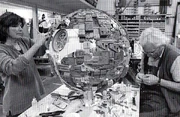
Affonso and Donovan working on the detailing of the sphere model
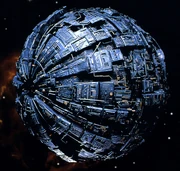
The finalized studio model
The external complexities of the Borg sphere meant it was easier to depict realistically with a studio model than with CGI. (Cinefantastique, Vol. 28, No. 6, p. 23) Shortly after Industrial Light & Magic model-maker John Goodson was appointed to lead the task of constructing the model, he received a phone call from John Eaves, in which Eaves expressed that they needed to do everything they could to make the sphere look new and interesting. (Star Trek: The Magazine Volume 1, Issue 23, p. 51)
The model of the Borg sphere was two feet in diameter. "We vacuformed about fifteen different patterns that conformed to this spherical curve, and covered those with a lot of molded and cast pieces," explained John Goodson. "Then we added tons of acid-etched brass over it, just like we had on the cube." (Cinefex, No. 69, p. 109) As well as Goodson, team members Barbara Affonso and Giovanni Donovan also worked on the model. (Cinefex, No. 69, p. 108) Despite appearing dark gray on screen, the model was actually painted mainly dark indigo (with silver and gold details). (Star Trek: The Next Generation Sketchbook: The Movies, p. 204)
That this craft's appearance is similar to the Death Star from the Star Wars films is not just coincidence, as ILM did all of the effects and modeling for Star Wars. The schematic of a Borg sphere shown in VOY: "Dark Frontier" depicts the craft's most striking resemblance to the Death Star.
For "Dark Frontier", Koji Kuramura digitally revamped the Borg sphere as a CGI model, at Foundation Imaging. (Star Trek Monthly issue 58, p. 46)
As of 2012, the original "Borg Sphere" physical studio model, virtually unmodified and having escaped the 40 Years of Star Trek: The Collection and It's A Wrap! auctions, is still in the possession of Paramount Pictures. The miniature has been on tour displays (such as Star Trek World Tour, Star Trek: The Adventure, and Star Trek: The Exhibition) as late as 2012. [1]


